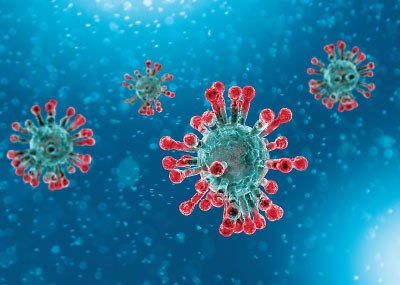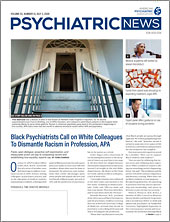While much of the focus of treating the most severe of COVID-19 cases has been on how to mitigate the acute effects of the virus on the lungs, many experts are warning about the rise of long-term psychological problems due to this pandemic.
“The global spread of this virus has created a universal, shared trauma,” said Suzi Hong, Ph.D., an associate professor of family medicine and public health and psychiatry at the University of California, San Diego (UCSD). “Everyone’s mental health is, in a sense, vulnerable.”
This vulnerability is amplified in the millions of people who have been infected with the virus and survived, she said. Though it’s still too early to know about the long-lasting psychological effects of COVID-19, a study from Hong Kong looking at mental health outcomes among survivors of the 2003-2004 SARS (severe acute respiratory syndrome) outbreak offers a clue about what may be to come. A survey of 369 SARS survivors found that 40% had a diagnosed psychiatric illness four years after the outbreak.
As psychiatrists prepare for a possible surge in the numbers of people with psychiatric illness, experts such as Hong believe it’s important to understand how much of the psychiatric burden in COVID-19 survivors may be due to the infection itself.
Neuropsychiatric Impact of Viruses
Researchers have long suspected and debated the neuropsychiatric impact of respiratory viruses. During World War I, Austrian psychiatrist and neurologist Constantin von Economo characterized a novel neurologic problem comm among wounded soldiers, which he called encephalitis lethargica (sleepiness was a common symptom). Many of these soldiers and others diagnosed with this disorder later developed mood problems, such as depression and mania.
Von Economo theorized this disorder was caused by a bacteria or virus—like the influenza virus that was spreading across the globe at the time. Other scientists, such as the prominent American psychiatrist Smith Ely Jelliffe, countered that these mood symptoms were psychosomatic, brought on by the stress of being sick.
Jelliffe’s position became the more popular belief in the short term, but data gathered from subsequent outbreaks—including preliminary data from COVID-19—has affirmed that respiratory viruses can infiltrate the brain, potentially leading to acute and chronic neuropsychiatric consequences. One early report of hospitalized patients with COVID-19 in Wuhan identified neurologic problems such as impaired consciousness or strokes in 45% of those with a severe infection.
The mechanisms behind COVID-19’s brain effects are still being teased out but are likely multifaceted, noted Hong and colleague Emily Troyer, M.D., a child and adolescent psychiatrist and post-doctoral research fellow at UCSD. Together they penned a recent review discussing the biological effects of COVID-19.
As the pair described in the review, preclinical studies in mice have shown that the virus can directly invade and kill brain cells. There have also been reports that the virus can trigger excess blood clotting, which can cause strokes. Additionally, the virus elicits a strong response from the immune system, which can cause neuropsychiatric problems from inadvertent damage to neurons done by various immune molecules as they fight off the invaders.
Side Effects From Medications Used to Mitigate COVID-19
In addition to the psychiatric effects that may be caused by the COVID-19 virus, pharmacological agents being used to try to help patients with severe infections come with their own neuropsychiatric risks. Side effects are a risk with any medication, but COVID-19 poses additional challenges since hospitals are using novel agents whose effects are unclear. Even drugs that are regularly used can be risky, as data emerging from the off-label use of the antimalarials hydroxychloroquine and other chloroquine compounds show.
These antimalarials were much touted by President Donald Trump early in the pandemic, after a few small studies suggested the medication could be used to treat or prevent the spread of COVID-19. In May—before larger clinical trials involving patients with COVID-19 were complete—the Food and Drug Administration (FDA) granted “emergency use authorization” to these medications. This distinction made it easier for health care providers to use these medications to treat suspected or laboratory-confirmed COVID-19 in adults and children hospitalized with severe disease. Subsequent evidence gathered from the trials since completed suggests these drugs are not particularly effective, and the FDA recently revoked the emergency authorization.
Though antimalarials are more commonly associated with potential cardiac risks, there is evidence antimalarials can trigger symptoms of insomnia, abnormal dreams, anxiety, mild paranoia, and/or acute memory problems.
These symptoms may signal the onset of quinine toxicity, which could lead to chronic neurological damage, noted Remington Nevin, M.D., M.P.H., Dr.PH., executive director of the Quinism Foundation, which seeks to raise awareness of this disorder. Nevin pointed out that many of these early toxicity symptoms mirror delirium; however, patients with chloroquine toxicity do not flicker in and out of consciousness, which physicians can use as a diagnostic indicator.
Steroid therapy, which is given to combat the hyperinflammation that manifests in many COVID-19 patients, is also known to induce psychiatric symptoms including psychosis, mania, and insomnia, according to a review by researchers at Mount Sinai School of Medicine. Early evidence, however, suggests the psychiatric effects of steroids are transient, the authors noted.
Could COVID-19 Lead to New Psychiatric Treatments?
Understanding how COVID-19 or medications being used to treat symptoms of the disease contribute to psychiatric problems is important from an intervention standpoint since such information may help to predict the numbers of patients likely to experience psychiatric effects, Troyer said. For instance, if the infiltration of COVID-19 on the brain plays a major role in psychiatric effects, then even infected people who display no respiratory symptoms might be at risk. If excess inflammation is the primary contributor, then those with milder cases might not develop problems in the future.
“Even if someone who is infected with SARS-CoV2 shows no overt symptoms, however, the immune system is still working behind the scenes,” Hong cautioned. “We don’t know enough to rule out any exposed individual.”
Researchers hope that as more is learned about the psychiatric effects of COVID-19, new understandings about medications may also be revealed. Troyer noted that Washington University in St. Louis recently launched a clinical study testing whether the antidepressant fluvoxamine might prevent severe symptoms in people who have been exposed to COVID-19 but who have not been hospitalized; fluvoxamine is one of several antidepressants known to have anti-inflammatory properties.
“We know that there are subtypes of depression and other psychiatric disorders that respond well to different treatments,” said Charles Marmar, M.D., the Lucius N. Littauer Professor of Psychiatry at New York University Grossman School of Medicine. “It might be the case that patients whose depression has a viral connection are more likely to improve with a biological treatment.” He encouraged psychiatrists to ask patients about their COVID-19–related experiences in the months ahead to guide treatment.
Marmar stressed to not forget the psychological toll of this pandemic. “Testing has suggested that maybe 20% of New Yorkers have been exposed to the virus, which is high; but 100% have been exposed to the structural damage to the city’s economy. We need to stay connected and maintain social support, get adequate rest and exercise, and keep believing that things will get better. Little measures like that will build resilience against mental illness in everyone.” ■
“Are We Facing a Crashing Wave of Neuropsychiatric Sequelae of COVID-19? Neuropsychiatric Symptoms and Potential Immunologic Mechanisms” is posted
here.
“Mental Morbidities and Chronic Fatigue in Severe Acute Respiratory Syndrome Survivors: Long-term Follow-up” is posted
here.
“Neurologic Manifestations of Hospitalized Patients With Coronavirus Disease 2019 in Wuhan, China” is posted
here.
“Psychopharmacology of COVID-19” is posted
here.

